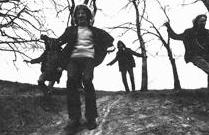
(All photos by Simon Danby)

(All photos by Simon Danby)
Out of the of the confusion and perpetual line-up changes that attended the last days of the Downtown Faction, there came a change of name and the band's evolution into Brethren. In the wake of various comings and goings, a stable line-up briefly flourished during late 1969. This consisted of Rod, Ray, Si and Jacka, but it was pretty much a seamless transition, and to this day it is not entirely clear where, in terms of timescale and personnel changes, Downtown Faction ended, and Brethren began.
As Rod tells it:
'The line-up was established in summer 1969 when I graduated from Durham and was asked to rejoin. Confusingly, this was half-way through recording the album (i.e. the Downtown Faction Tapes). Basically, Richard Squirrell left and Jacka & I joined - though that makes it sound neater than it actually was. Jeff Sadler stayed a bit longer and was on more of the album. After he left, it changed from Downtown Faction to Brethren (I think).'
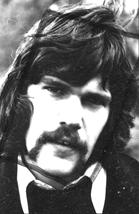
|
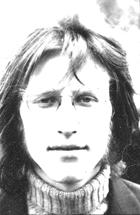
|
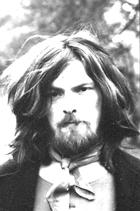
|
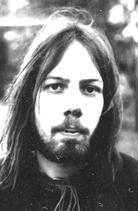
|
However, the clear watershed came when the Faction's trademark progressive blues sound was abandoned in favour of a more acoustic/ folky approach. Rod explains:
'I think we were marking the change from the electric blues/progressive style of the Downtown Faction to the acoustic sound brought about by the whole Jacka mandolin, me fiddle/slide, me & Si both playing open-tuned acoustics things - and Jacka having the Woody Guthrie album with Jackhammer Blues etc. on it, & me getting more into folk-blues, and me & Si being into Bert Jansch, John Renbourn etc. - and the idea of doing our own songs and Dylan songs and more obscure stuff, with this approach - we felt it was time to advertise these internal changes with a new name & identity - a relaunch, basically.'
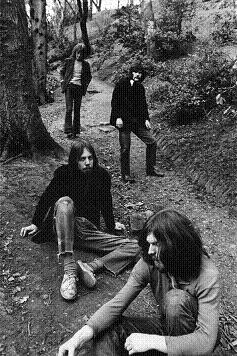
|
In 1969, with the advent of heavy rock, it must have seemed that they were swimming against the tide, but as events were shortly to prove, the move was an inspired one.
Thanks to a session by photographer Simon Danby at Jesmond Dene, Newcastle, photos of Brethren are in more plentiful supply than recorded material. However, a fine example of this new direction can be heard on a 1969 recording of the Simon Cowe composition Positive Earth, which graces Buried Treasures Volume Three as the opening track, taken from a session at Impulse Studios, Wallsend. For present purposes, this recording will be primarily of interest for the fact that it is graced by Rod's then fairly recently-acquired virtuoso fiddle skills. |
'As far as I'm concerned it was still the Downtown Faction - Jacka on vocal & harp, Jeff lead guitar, me bass, Ray drums - can't remember if Si was on it.'
Brethren even appeared as a drumless trio on occasion, and it was in this format that the band ventured into the Rex folk club and picked up Alan Hull. In those far-off and unenlightened times, drums weren't allowed in folk clubs. Well, not in the Rex, anyway.
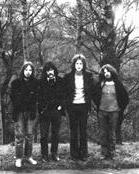
1970 We Can Swing Together
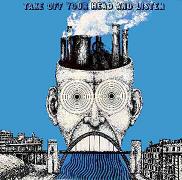
After a short period of independent existence, Brethren threw in their lot with the emerging and prodigiously prolific singer-songwriter Alan Hull in May 1970. The new combination variously performed as Alan Hull and Brethren, and as Brethren with Alan Hull, on an entirely interchangeable and pragmatic basis, before finally fixing upon the name of Lindisfarne during the summer of 1970.
North Shields' 'fab four' were no more, and for the even fabber five, the story had just begun.
Again, very little in the way of recorded material survives to represent this brief transitional period, but a live and, to say the least, unusual, version of Alan's song We Can Swing Together surfaced as the concluding track on the sampler album Take Off Your Head And Listen, released by Rubber Records in October 1971. This compilation featured a variety of locally famous and almost famous acts on the Tyneside folk scene, of which Alan Hull and Brethren, now known as Lindisfarne, had emerged as out and away the most promising. The song, the recording quality of which was about as impressive as the spelling on the sleeve notes, was attributed to 'Alan Hull & Bretheren (plus friends)', and is of interest more from a historical perspective than any other. Positive Earth, already noted above, provided the penultimate track, and in this context was credited to 'Alan Hull & Bretheren'.
Towards the end of 2001, I listened to a broadcast of a radio interview with Rod and Mitch. I was at least mildly amused to hear Rod refer to the Promenade incarnation of Lindisfarne as a 'brotherhood'. I asked Rod if he had been consciously invoking the Brethren concept. His response was candid and enigmatic as ever:
'Not consciously, no, but I wouldn't totally deny it either.'
|